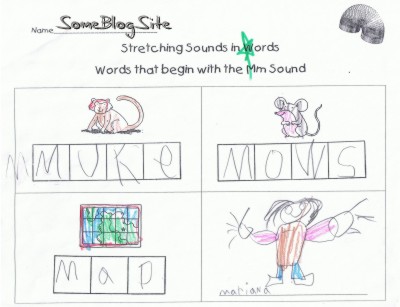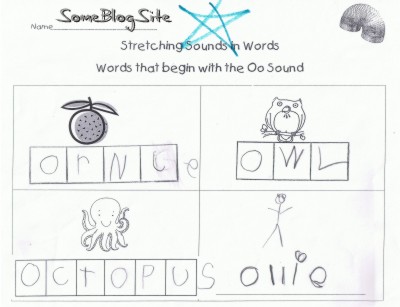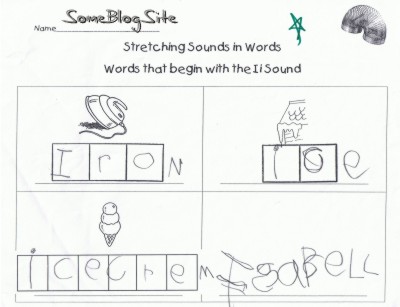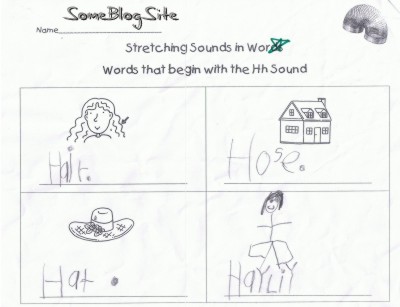Pblk Education
Mar
22
2010
Alpha attends the local public school. He was able to read before starting kindergarten, but not all of his classmates are at that level so the teacher teaches to the lowest common denominator. That means the public school is causing my child to regress. His spelling is getting worse by going to school. (that’s his going to school, not his spelling that attends . . . oh never mind).
The teacher has a lesson, and it seems that all students are to follow the lesson. The problem is that the lesson is about letter sounds and spelling words as they sound, not how they are spelled.
Here is an example. Alpha brought his schoolwork home, as he does just about every day. We saw this:
My wife noticed how he spelled the words and just asked him “Alpha, how do you spell ‘mouse’?”
And he replied “M-O-U-S-E“.
“Why did you spell it ‘M-O-W-S?”
“That’s how everyone else spelled it.”
Then she asked “And how do you spell ‘monkey’?”
“M-O-N-K-E-Y”
“And why did you spell it M-U-K-E?”
“That’s how the teacher told us to spell it.”
My wife and I were taken by surprise at this. The teacher had warned us at the beginning of the school year that we were not to correct our child’s spelling, so that she (the teacher) could see the child’s progress throughout the year. In theory, the teacher would see that the child was spelling poorly as he was just learning letter-sound concepts and then, at the end of the year, the child’s spelling would be better as he has learned word concepts.
“In theory” is the critical part of that paragraph.
What happens when a child already knows how to spell the required words? How does the teacher measure progress then?
Now, lest you think we made too much fuss over one piece of paper, let me describe to you some more of the story.
We had discussed our concern with ourselves, and we explained to Alpha that he should still do the right thing even though his classmates were not. “Some of them haven’t learned how to spell words yet, so the teacher is trying to help them. If you do know how to spell a word, you should write it correctly.” And we all were satisfied with this plan.
Then Alpha brought home his next paper.
He spelled “orange” as “ornje”.
“Alpha, why did you spell orange like this? It looks like you had it right with the G there.”
“The teacher made me change it.”
That’s right, he spelled orange with the proper letter and the teacher had him erase it and put the wrong letter in there (click on the picture for a larger view). He already knows that G can have a hard or soft sound. And he knows that orange is spelled with a G, not a J.
To be fair . . . he had a substitute teacher that day. But why would the sub do that? Either she had strict orders from the teacher or she went through the same spelling curriculum training as the teacher. Either way, she had to have been told by someone that kindergartners cannot know how to spell and she must enforce illiteracy. And either way, we are not impressed with what we’re getting for our tax dollars.
Just for fun, to torment the kids who can spell, they made almost enough boxes for the letters. They left off one or two boxes for each word.
It’s like musical chairs for spelling. There are 4 letters but only 3 spots. Which letters can find their places first? Which letter will be left standing? Oh, too bad. Letter N is out.
If only they made the spelling sheets with an area for writing the word instead of letter boxes. Then the children could spell the words the way they wanted, including the right way.
I don’t know why they did that for one letter sheet but not the others. Most of the letter sheets had the wrong number of boxes for correctly spelling the words.
Unfortunately, Harrison Bergeron is applicable once again. You would think a teacher would encourage excellence and high standards and good stuff.
If it’s kindergarten and we’re already having conflicts about what the school is teaching versus what we the parents think is right, I am not optimistic about junior high or high school. And the conflict is over the rather innocuous subject of spelling.
On the bright side of things – at least that’s the only problem we’ve had with the school. We’ll just be sure to keep our children supplied with real books that use real English words. That way, they will learn literacy at home and can be prepared for life.
The Jews then were astonished, saying, “How has this man become learned, having never been educated?”
John 7:15

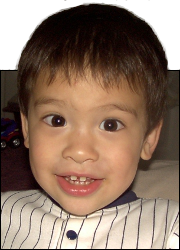 This is Alpha, the first-born, when he was 2YO.
This is Alpha, the first-born, when he was 2YO. This is Beta, the second-born, when he was about 2YO.
This is Beta, the second-born, when he was about 2YO. This is Gamma, the third-born, when he was about 18MO.
This is Gamma, the third-born, when he was about 18MO.
